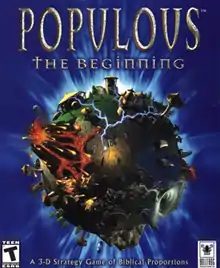Populous: The Beginning
Populous: The Beginning is a real-time strategy video game and the third entry in the Populous series, developed by Bullfrog Productions. The game was released in 1998 on Microsoft Windows, and in 1999 for the PlayStation. Unlike earlier games in the series, which cast the player in the role of a god influencing loyal followers, The Beginning took a radical departure and placed the player in the role of a shaman, who directly leads her tribe against opponents. Throughout the twenty-five missions of the campaign, the player leads their tribe across a solar system, dominating enemy tribes and tapping new sources of magic, with the ultimate goal of the shaman attaining godhood herself.
| Populous: The Beginning | |
|---|---|
 | |
| Developer(s) | Bullfrog Productions |
| Publisher(s) | Electronic Arts |
| Producer(s) | Stuart Whyte[1] |
| Composer(s) | Mark Knight |
| Series | Populous |
| Platform(s) | Microsoft Windows, PlayStation |
| Release | Microsoft WindowsPlayStation |
| Genre(s) | Real-time strategy |
| Mode(s) | Single-player, multiplayer |
Populous: The Beginning was the first entry in the series to use 3D computer graphics; Bullfrog waited four years after Populous II: Trials of the Olympian Gods so that the graphics technology could catch up to their vision for a new and different game in the series. The developers considered the addition of terrain deformation and manipulation, combined with "smart" villagers who automatically attended to tasks, to add an entirely new dimension to the series. The game's original title was Populous: The Third Coming before being changed prior to the beta release.
Populous: The Beginning plays very differently from earlier titles and received mixed reviews. Critics noted the excellent graphics, while complaints were directed at the artificial intelligence and the indecision in game design between being a real time strategy title and a god game. GamePro's Peter Olafson wrote that Populous: The Beginning was a good game but was "without a quintessential quality that defined Populous."[4]
Gameplay

Whereas previous Populous games were god games where players assumed the role of a god with terrain-altering abilities, Populous: The Beginning adopts elements of real-time strategy games. Rather than being a god, the player controls a Shaman trying to become one, and directly controls the actions of followers, by ordering them to build structures or attack enemies.[5][6][7] In the campaign, the player must fight the opposing Dakini, Chumara and Matak tribes for dominion over the solar system.[8] Enemy tribes also have shamans, and on later levels all inhabit the same world. While the objective is almost always to eliminate all of the members of the other tribes, there are often specific ways this can be achieved.[5] Sometimes the player must use magic spells gained from worship at special artifacts such as stone heads or obelisks;[9]: 3 these spells include tornadoes, or volcanos that create new landmasses.[7] In other cases, the player only needs to overwhelm the enemies with superior numbers. The game has no formal resource management; new units are created automatically at houses, and training new troops costs nothing except mana. Only wood from trees is required to build new structures.[9]: 4–5
In comparison to the isometric presentation of the previous games in the series, Populous: The Beginning features three-dimensional graphics,[10] with the game camera at a variable height and capable of rotating 360°, enabling the player to quickly move across the planet's terrain. While the terrain's topology is a torus, the map is locally projected onto a sphere to give the illusion of a planet. On maps where there is no fog of war, players can see what opponents are doing at any time. Extensive support for 3D acceleration enables the player to view the game in 16-bit or 32-bit colour.[9]: 8–9 The landscape and real-time structure building and follower movement are also shown.

The player commands different types of followers, each of which has advantages and disadvantages in combat. The most basic unit is the Brave, which builds huts, towers, and military buildings. Braves are trained to become other units: tough melee Warriors; weak, long-range, Firewarriors; Preachers, who convert enemy units and prevent enemy preachers from converting friendly troops; and Spies, who perform espionage functions.[4] Shamans are physically weaker than warriors, but can cast powerful spells and can be reincarnated if killed.[9]: 4 Some spells will disappear after use. Other spells can slowly be replenished for continued use; the rate of spell regeneration depends upon the player's number of followers. Examples of spells include "Landbridge", which raises the sea floor to create bridges across the sea; "Swarm", which sends a horde of insects to sow confusion in enemy ranks; and "Tornado", which creates a cyclone to destroy buildings. There are twenty-six spells in total,[4] which are slowly learned throughout the campaign.[5]
Populous: The Beginning supports multiplayer, either by modem connection (limited to two players), IPX, or over the Internet through an external matchmaking service. Populous: The Beginning allows for a maximum game size of four players playing against each other.
Plot
Populous: The Beginning takes place before the first two games in the series[11] in a planetary system of twenty-five unnamed planets. These worlds are inhabited by four human tribes, represented by their color: the green "Matak", the yellow "Chumara", and the red "Dakini". The fourth blue tribe, controlled by the player, is unnamed. Each of the tribes is generally hostile to one another, though alliances exist on some worlds. All the tribes are ruled by a single female shaman. In addition to the organized tribes are 'wildmen',[9]: 8 neutral characters who cluster in groups around trees and water. Though they cannot attack or be attacked, players can use the Shaman's Convert spell to bring wildmen under her tribe's control.
The player's goal as Shaman is to become a deity; only by defeating all the enemies in the system can the player's shaman become omnipotent.[9]: 2 The player begins on the planet furthest from the sun, and attacks each planet in sequence. Along the way, the Shaman learns new skills and magic to defeat her enemies. Victory requires the player to either destroy the opposition, or on occasion perform special actions. The player loses if the Shaman is killed and there are no remaining followers, if the Shaman is killed and there is no circle of reincarnation, or the player runs out of time on timed levels.[9]: 7 Upon beating back the other tribes, the Shaman ascends to godhood and helps her people conquer the Matak, Chumara and Dakini in one final conflict.[12]
Development
Bullfrog Productions released Populous (video game) in 1989, followed by Populous II in 1991.[10] The Populous series inspired the term "god game", with players assuming the role of an omniscient being who leads their people to new territories or into battle.[13] Populous: The Beginning was the first in the series developed with entirely 3D graphics, allowing the environment to be scaled and rotated in real time (though characters remained two-dimensional.)[14][15] The game was published more than four years after Populous II, as Bullfrog waited for hardware advancements to enable a new approach,[16] and was the first in the series to be made without Populous creator Peter Molyneux, who had sold Bullfrog to Electronic Arts in 1995 and left after the release of Dungeon Keeper to form Lionhead Studios.[6][17] Producer Stuart Whyte said of the work, "We're really proud of what we've done in software because it does look really nice."[1]
Alan Wright, the game's project leader, stressed both the departure Populous: The Beginning took from previous titles in the series, as well as distinguishing itself from similar games like Command & Conquer. The elements of smart villagers and terrain-reforming, he said, "adds a whole level of gameplay not found in those titles."[16] Bullfrog representative Brian Allen asserted that these departures distinguished Populous: The Beginning from other real-time strategy games on the market at the time.[13] In some aspects, the developers were forced to remove features due to technical constraints; for example, the "Plague" spell from previous Populous titles was dropped because in practice the spell was too frustrating.[1]
Art lead Phil McLaughlin recalled that they wanted the characters to look primitive yet familiar, as opposed to something too fantastic; the final characters had to be constructed from very few polygons, so character concepts (done by Mark Pitcher) did not always satisfactorily translate to the finished product. Textures were assigned to different altitudes of the map and blended using masks, allowing for vibrant and varied landscapes without too much developer effort.[18] The music was composed by Mark Knight, who had joined Bullfrog's team in 1997.[19]
A number of strategy and god games being produced in 1998 and 1999, especially at Electronic Arts, where Populous: The Beginning was expected to be one of its standout titles.[20] Originally, the game was known as Populous: The Third Coming,[16] but the name was changed by the time the game was shown in a fully playable beta form in late 1998.[16]
Bullfrog released an expansion to Populous: The Beginning, Undiscovered Worlds in 1999. This add-on was only made available in the UK and US, and offered twelve new single-player and twelve multiplayer levels,[21] with a continuation of the storyline begun in the previous game, where the player takes on the role of a new shaman who must restore peace to the solar system.[22]
Reception
| Aggregator | Score |
|---|---|
| GameRankings | 80%[23] |
| Publication | Score |
|---|---|
| AllGame | |
| CVG | |
| Edge | 8/10[26] |
| GamePro | 4.5/5[4] |
| GameRevolution | B+[27] |
| GameSpot | 7.5/10[5] |
| Hyper | 88/100[28] |
| IGN | 8.6/10[11] |
| Jeuxvideo.com | 18/20[29] |
| PC PowerPlay | 86%[30] |
| PC Zone | 92/100[31] |
| Video Games (DE) | 75%[32] |
Populous: The Beginning received generally favorable reviews on release with some strong criticisms to follow. IGN's Ward Trent was especially smitten with the immersive 3D graphics.[11][12] Edge stated, "previous Bullfrog games have always placed gameplay above graphical finesse, but that's no longer the case."[33] GameSpot's reviewer Ron Dulin appreciated how The Beginning was a daring revamp of the series, instead of a safe, slightly modified sequel (like the earlier Populous II: Trials of the Olympian Gods).[5] Computer and Video Games rated The Beginning as a "better play" than the original.[6]
Complaints about the game centered on the difficulty of controlling followers, the simplicity of gameplay, and the tension between game styles. The game's AI allowed followers to automatically construct buildings,[16] but this led to problems directing them in the midst of a hectic battle.[5] IGN noted that with the player's followers automatically going about daily life, the replay value was lowered even with the multiplayer options.[11] Others agreed that the automation rendered gameplay too simple, with no upgrades or serious resource management,[12][33] a sentiment PC Gamer expressed when they wrote that the missions "become mind-numbingly repetitive".[34]
Populous: The Beginning played very differently from earlier titles. Edge concluded that while the more rigid play format of The Beginning was new to the series, it had the effect of making the result "less show-stopping"; Edge believed that the game was caught between the god game and RTS genres, and did not excel at either.[34] PCGamer subsequently decided the game failed to live up to the previous games in the series. More charitably, GamePro's Peter Olafson wrote: "Populous: The Beginning is not a bad game, in fact a good one; but it's a different game—one without a quintessential quality that defined Populous."[4]
Populous: The Beginning was not a commercial success, and to date remains the final game in the franchise. Electronic Arts shut down Bullfrog in 2001. The official multiplayer servers for Populous: The Beginning went offline in 2004, but the game's multiplayer was kept alive through Populous: Reincarnated, managed by a group of dedicated fans.[35]
References
- Blevins, Tal (October 5, 1998). "Populous: The Beginning Preview". IGN. Archived from the original on March 11, 2002. Retrieved September 4, 2007.
- "News Briefs". IGN. November 17, 1998. Archived from the original on March 1, 2000. Retrieved December 6, 2019.
- "Populous: The Beginning at GameSpy (PS)". GameSpy. Archived from the original on November 4, 2010. Retrieved January 5, 2011.
- Olafson, Peter (January 1, 2000). "Review: Populous 3". GamePro. Archived from the original on May 21, 2003. Retrieved September 7, 2007.
- Dulin, Ron (December 11, 1998). "Populous: The Beginning for PC Review". GameSpot. Archived from the original on September 30, 2007. Retrieved September 8, 2007.
- "PC Review: Populous: the Beginning". Computer and Video Games. September 13, 2001. Archived from the original on August 5, 2009. Retrieved January 5, 2011.
- Staff (December 1998). "Coming Soon: Populous: The Beginning". Computer and Video Games. No. 205. p. 28.
- Johnson, Andy (September 22, 2010). "Tribal Spirituality in 'Populous The Beginning'". PopMatters. Retrieved April 25, 2017.
- Bullfrog Studios, ed. (November 30, 1998). Populous: The Beginning Instruction Manual. Electronic Arts.
- Staff (April 2006). "Good God". Retro Gamer. No. 23. pp. 74–79.
- Ward, Trent (January 1, 1999). "IGN: Populous: The Beginning Review". IGN. Archived from the original on April 8, 2003. Retrieved August 21, 2016.
- "Populous 3: 'Nothing to Write Home About'". Game Review. September 22, 2002. Archived from the original on September 28, 2007. Retrieved September 7, 2007.
- Chick, Tom (1997). "Populous: The Third Coming; The return of the god game". Computer Games Magazine. Archived from the original on July 5, 2003.
- "NG Alphas: Populous 3". Next Generation. No. 31. July 1997. p. 117.
- Merideth, Graeme (August 29, 2020). "Populous: The Beginning is an unintentional epilogue". PC Gamer. Retrieved January 2, 2022 – via Youtube.
- Poole, Stephen (August 21, 1997). "The Beginning Preview at GameSpot". GameSpot. Retrieved September 8, 2007.
- Nunneley, Stephany (March 22, 2014). ""EA is not an evil empire," but Bullfrog endured 'love abuse' after acquisition, says Molyneux". VG247. Retrieved January 2, 2022.
- Staff (December 2012). "Bullfrog: A Legacy". Retro Gamer. No. 110. p. 66.
- "Mark Knight profile". MobyGames. Retrieved September 8, 2007.
- Boxer, Steve (August 1998). "Gaming Trends for 1998/99". PC PowerPlay. No. 27. p. 48.
- "Populous 3 - Undiscovered Worlds". Computer and Video Games. Archived from the original on November 21, 2007. Retrieved September 8, 2007.
- "Populous: The Beginning — Undiscovered Worlds". MobyGames. Retrieved September 5, 2007.
- "Populous: The Beginning Reviews". GameRankings. Archived from the original on September 12, 2007. Retrieved September 6, 2007.
- Smith, Nick. "Populous: The Beginning – Review". AllGame. Archived from the original on November 14, 2014. Retrieved June 2, 2021.
- Hutala, Alex (May 1999). "Populous". Computer and Video Games. No. 210. p. 50. Retrieved June 2, 2021.
- "Populous: The Beginning". Edge. No. 66. Christmas 1996. p. 92. Retrieved June 2, 2021.
- Dr Moo. "Populous: The Beginning – PC". GameRevolution. Archived from the original on May 26, 2006. Retrieved June 2, 2021.
- Toose, Dan (January 1999). "Populous: The Beginning". Hyper. No. 63. pp. 72–73. Retrieved June 2, 2021.
- Vinsssounet (September 24, 2010). "Populous Test : A l'Aube de la Creation sur PC". Jeuxvideo.com (in French). Archived from the original on May 2, 2021. Retrieved June 2, 2021.
- Dewhurst, John (January 1999). "Populous: The Beginning". PC PowerPlay. No. 32. pp. 64–65. Retrieved June 2, 2021.
- "Populous: The Beginning". PC Zone. No. 70. December 1998. pp. 84–89. Retrieved June 2, 2021.
- Gut (April 1999). "Populous – The Beginning". Video Games (in German). p. 92. Retrieved June 2, 2021.
- "Edge". No. 66. Christmas 1998. pp. 92–93.
- McDonald, T. Liam (March 1999). "Populous: The Beginning". PC Gamer: 134–135.
- Milne, Oliver (March 14, 2017). "Meet the superfans still playing Populous: The Beginning". Rock Paper Shotgun. Retrieved January 1, 2022.